Sometime in my late teens / early 20s, I came across this phrase: unfulfilled potential. I can’t remember if it was something a college professor mentioned, a phrase I read in a book, or a line I heard in a movie.
But somehow, this phrase managed to bury itself in my subconscious and became some kind of a driving force. And by this, I mean that the idea of unfulfilled potential became my biggest fear.
Potential is one of those loaded words, isn’t it? — particularly when it’s our individual potential that we’re talking about.
Initial inklings of our potential were likely suggested by parents, seeds planted by early mentors. For others, it may have been something more organic, a kind of inner smoldering that grew by itself. It may have started vague or small, something modest that continued to gather steam when we stepped outside our family’s haven and saw more of the world.
The more aware we were of our potential, the more likely — though not guaranteed — we were driven to fulfill it. Because, how incredibly sad would it be to reach the end of the road only to realize we did not do anything about what we were capable of doing?
And while it was easier (and usual) to conflate potential with “a career,” it need not have been the case. It may have been a continuous, unrelenting life’s work, this pursuit, or ebbing and flowing as reality pushed itself and the world served what it wanted to serve, our potential be damned.
(It hit me that I’ve been writing in the past tense. As if, the process of fulfilling our potential is all done now. But of course, this isn’t the case. We are always works in progress, always in the process of becoming. I only meant that you, my reader friend, are likely to be in midlife, just like me… and some degree of looking back and reflecting is happening here.)
• • •
There’s actually a term for this process of reaching our potential: self-actualization. It’s a concept originally introduced by Kurt Goldstein, a physician specializing in neuroanatomy and psychiatry, in the early half of the 20th century. Goldstein contends that self-actualization is the ultimate goal of all organisms. (Source)
It was, however, American psychologist Abraham Maslow who popularized self-actualization, the pinnacle of Maslow’s Hierarchy of Needs. In his major work, Motivation and Personality (1954), Maslow writes (emphasis mine):
A musician must make music, an artist must paint, a poet must write, if he is to be ultimately at peace with himself. What a man can be, he must be. This need we call self-actualization. It refers to man’s desire for self-fulfillment, namely to the tendency for him to become actually in what he is potentially: to become everything one is capable of becoming.
Both Goldstein and Maslow point to self-fulfillment as a need, the ultimate goal, something we, all of us, intrinsically want in our lifetime. Of course, we want to feel fulfilled. In our final moments, we want to know we’ve made something of ourselves, something of our lives. And yet, it’s not the easiest thing to do and requires quite a bit of courage and discipline.
In The Farther Reaches of Human Nature (1993), Maslow writes:
We fear our highest possibilities. We are generally afraid to become that which we can glimpse in our most perfect moments, under conditions of great courage. We enjoy and even thrill to godlike possibilities we see in ourselves in such peak moments. And yet we simultaneously shiver with weakness, awe, and fear before these very same possibilities.
Although I like to think of myself as driven, I certainly wasn’t consciously working on fulfilling my potential all the time. Goodness. There were many detours and times when I felt completely lost and questioning, “What the hell am I doing here?” But there was, I think, a through line. Yes, I can see that.
And I think it is this working toward our potential — no matter how stuttering it may have been at times and perhaps more than actually reaching it — that is crucial. Maslow points out further:
If you deliberately plan to be less than you are capable of being, then I warn you that you’ll be deeply unhappy for the rest of your life. You will be evading your own capacities, your own possibilities.
• • •
“I could have been this, or I could have been that” are statements often said with sadness or regret, proving Maslow’s point. I personally avoid going there myself, reasoning that I’ve made choices given where I was and what I knew at certain proverbial crossroads in the past. What would be the point in rehashing those now? Sliding Doors, you know.
But here we are, wherever we are at this point, and it’s not over. We are always becoming, and what we choose to do from hereon counts just as much… perhaps, even more so.
🏷 A Fulfilling Life
💭 muse
“We cannot live the afternoon of life according to the program of life’s morning; for what was great in the morning will be little at evening, and what in the morning was true will at evening have become a lie.” — Carl Jung
👤 a midlifer in profile
Meet Gen X’er Dawna Kreis.
Dawna says one thing she is working on these days is self-care.
“For years, I put everyone else's needs, wants, and desires ahead of my own. I believed that's what a good wife and mom did. When my body developed and was diagnosed with colon cancer, though, I was forced to realize the truth in what my mom had always tried to get across to me — you can't take care of anyone else unless you take care of yourself first.” — Dawna Kreis
Read the rest of Dawna’s profile here.
🍹 reader shout-out
Big shout-out to WAGO reader, Yvonne Marchese, age agitator, author, and founder of The Age Agitators Club. This community brings together women committed to busting through their Midlife Funk to inspire, support, share our stories, and reimagine what’s possible as we grow older. Learn more about The Age Agitators Club.
💬 last word
The nose is buried in books these days. My idea of summer heaven. I also picked up a couple of books in a genre I don’t usually read — cozy mystery — and found them thoroughly enjoyable! Who knew?!
How’s your summer been?
Here’s to an easeful week ahead.
Cool Beans,
Lou Blaser









very nice read, thx a lot. I now write haikus in French, English , German and Picard ( a regional dialect spoken between Northern France and Southern Belgium ) to heal from the past and sort of foresee the future .
ypu can check that at : Étchilibe instabe / Équilibre instable https://amzn.asia/d/bbe3dG9